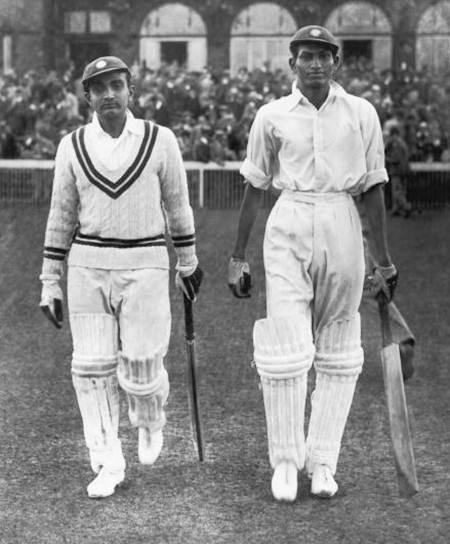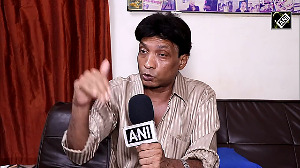
'Syed Mushtaq Ali was like a lion, not a labourer, at the crease. Attack was his defence and he would show no mercy on the bowlers'
Haresh Pandya salutes the swashbuckling batsman who would have turned 100 on Wednesday, December 17.
'There was suppleness and a loose, easy grace which concealed power, as the feline silkiness conceals the strength of some jungle beauty of gleaming eyes and sharp fangs. At times his cricket was touched with genius and imagination,' gushed the peerless Neville Cardus, in his generous and inimitable style, about Syed Mushtaq Ali, India's first Test centurion overseas, who would have turned 100 on December 17 had he not passed into the ages on June 18, 2005.
'He was the Errol Flynn of cricket. Dashing, flamboyant, swashbuckling and immensely popular wherever he played,' wrote Keith Miller, himself not less handsome and loved.
The great Australia all-rounder, who later established himself as a professional journalist of repute, was only echoing the sentiments of many who saw Mushtaq in action and followed his chequered career closely. Mushtaq Ali's dazzling popularity could be imagined and understood from one example.
Image: Vijay Merchant, left, and Syed Mushtaq Ali walk out to bat on Day 1 of the Test against England at Old Trafford, on July 25, 1936.
Photograph: Keystone/Hulton Archive/Getty Images
In 1945, immediately after World War II, an Australian Services team, led by Lindsay Hassett, toured India. Mushtaq Ali was selected in the Indian team for the first 'Test' in Bombay, but he could not play as he was indisposed. He was surprisingly dropped for the second 'Test' in Calcutta despite being hale and hearty. This upset Calcutta cricket lovers so much that they aggressively protested and forced the selectors to change their decision.
"Hundreds of my fans walked in protest to the Eden Gardens pavilion. They were threatening the very 'Test' with placards and slogans: 'Bring Back Mushtaq', 'No Mushtaq, No Test' and so on. Before anyone understood what was happening, they broke into the pavilion. Their intentions were visibly violent."
"Some of them grabbed Kumar Shri Duleepsinhji, the chairman of the selectors, by his tie and began to manhandle him. Luckily, I was there to save him. Varna unka bahoot boora haal ho jata (otherwise his condition would have been very serious)."
"I asked them not to be so rude and violent and assured them that I would definitely play. Ultimately, the selectors were left with no other option but to select me," he told me during a personal, emotional, interview at his home in Indore in 2000.
Though compelled to play him at Calcutta, the selectors remained sceptical. Yet he made another comeback in the third Test against the West Indies in 1948-1949 and essayed two delightful innings of 54 and 106 -- again at the Eden Gardens.
The people of Calcutta have hardly or never shown such love and warmth for a non-Bengali cricketer. But, then, the lustre of Mushtaq Ali's sunshine cricket and his incredible fame and popularity had spread across Bengal, too. He had already scored a century, in the third 'Test' against Lord Tennyson's team in 1937-1938, at the Eden Gardens. So the dropping of their favourite batsman from the playing eleven was something Calcutta cricket lovers were just not prepared for.
Mushtaq Ali was out and out a people's player. His nature, personality and approach to the game were such that he was just not for the statistical minded. With his thoroughly positive outlook and intent to entertain the paying public, he was like a lion, not a labourer, at the crease.
Attack was his defence and he would show no mercy on the bowlers. Aficionados all over the world have always taken such cricketers to their hearts, be it Mushtaq Ali, Virender Sehwag or David Warner.
They never curb their natural game, whatever the prevailing situation, and do not allow the bowlers to dominate, let alone torment, them. You would never find them labour or struggle for runs. Mushtaq Ali, as was his wont, always lived, though dangerously sometimes, like a king at the crease.
In spite of being an attacking player his batting was not all violence and savagery. There were artistry and elegance, as well as flashes of poetry and romance, in his shots which fascinated the cognoscenti and delighted the lay fans.
Tall, upright and athletic with an aura of sorts around him, he was one of the most natural batsmen endowed with wrists of steels and good technique and temperament to take on the best of bowlers.
He possessed a wide range of shots and he executed them most attractively. He relished cutting, driving and pulling and was strong both on the back-foot and front-foot.
Mushtaq Ali and Vijay Merchant were India's first notable and fairly successful opening pair. While Mushtaq Ali was an entertainer par excellence, Merchant was a stonewaller who, like Geoffrey Boycott was to say years later, believed that if you stayed at the wicket, runs would come automatically.
So bored was India's captain, the Maharajkumar of Vizianagaram, better known as Vizzy, by Merchant's slow batting on the 1936 tour of England that he was said to have promised Mushtaq Ali a gold watch to run out Merchant in the first Test at Lord's.
Vizzy had obviously approached the wrong man. A gentleman to the core on and off the field, Mushtaq Ali politely refused to obey his captain's command. In the very next Test, at Old Trafford, Manchester, India started the second innings 368 runs behind. But, as if to convey a message to the spiteful Vizzy, Mushtaq (112) and Merchant (114) made history by putting on 203 runs for the first wicket in less than 160 minutes.
For a change, Merchant returned fire with fire and Mushtaq Ali, batting in cavalier fashion, repeatedly went down the track to upset the rhythm and confidence of fast bowlers, driving and pulling with lightening reflexes, and elan.
When he was four short of 100, an English player patted him on the back and said: 'You need only four runs for a memorable hundred. Don't throw it away.' Mushtaq did not and became the first Indian to score a Test century abroad.
He was eventually out caught and bowled for 112 in a little over two hours and was presented a gold watch, in the presence of all, by Vizzy.
More than the runs he made, it was the manner in which he played that made Mushtaq a darling of everyone present.
'Ranji would have been the happiest man to witness your innings,' an ecstatic C B Fry, no less, told him. Some praise.
The duo had salvaged some pride for their demoralised team on a difficult tour. So impressed was Cardus by Mushtaq and Merchant, who dashed England's hopes of going 2-0 up in the series, that he called them 'the poetry and prose' of Indian cricket.
Mushtaq Ali was only 19 when he made his Test debut against England, at Calcutta in 1933-1934, as a right-hand batsman and orthodox left-arm spinner. He bowled 19 overs in England's first innings and took the prized wicket of Douglas Jardine (61).
Interestingly, while Merchant batted at No 6, Mushtaq Ali batted at No 7, and made 9 runs, in India's first essay. Merchant did not open in the second innings either, though Mushtaq Ali did and scored 18 before being consumed by fast bowler Stan Nicholas.
Those were early years of Indian cricket. India, which became a full member of the International Cricket Council in 1932, did not play too many Tests. Yet, a batsman of Mushtaq Ali's class deserved to play more than mere 11 Tests.
While World War II robbed him of opportunities, on a couple of occasions he was a victim of the petty politics that is rampant in Indian cricket since the BCCI came into being.
Mushtaq Ali was a pillar of the great Holkar side, among other teams, and was one of the few batsmen who accompanied the redoubtable Denis Compton at the other end when the Englishman scored his famous 249 not out against Bombay in the 1944-45 Ranji Trophy final at the Brabourne stadium.
In an era in Indian cricket dominated by the two stonewalling but heavy-scoring Vijays (Merchant and Hazare), Mushtaq Ali held his own with his spectacular batting and selfless love for the game. Like C K Nayudu, he was a true entertainer and amazing crowd-puller.
MUST READ












 © 2024 Rediff.com -
© 2024 Rediff.com -